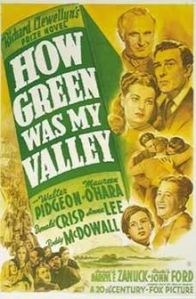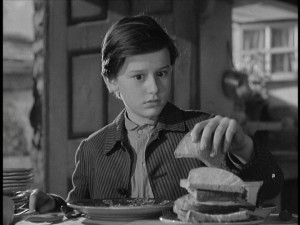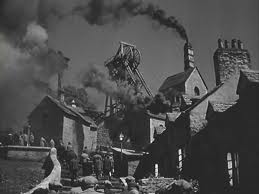1941: How Green Was My Valley
“Memory. Strange that the mind will forget so much of what only this moment has passed and yet hold clear and bright the memory of what happened years ago of men and women long since dead,” – Huw Morgan waxing poetic, How Green Was My Valley.
1941’s Best Picture, How Green Was My Valley, is more commonly known as “that fucking movie that beat Citizen Kane.” While bitching about who won the Oscar is a sport as old as the awards themselves, to cinephiles, the defeat of Citizen Kane is particularly hard to stomach. Nevertheless, I entered my first viewing of Valley hoping to find some underappreciated masterpiece, a movie that turned out to be something really special in its own right. Alas, this was not the case.
While not as outright terrible as Cavalcade, Valley is still very sugary and very, very dull. It’s another movie about the onslaught of modern times, but takes a more microeconomic approach to its story. That’s is a hoity toity way of saying that instead of focusing on the big improvements in terms of roads, law and the economy (like in Cimarron, another Best Picture about modernity), this movie looks at the price paid by blue collar laborers in the light of such earth-shaking changes (and a little bit to the price paid by the Earth itself).
The movie starts in modern times (for 1941), where the titular Welsh Valley and its scenic village have been ravaged by years of over-mining and general industrial neglect. As the narrator packs his belongings to leave, he thinks back to his time as a child, when the Valley was green (allegedly – the film is in black and white) and the inhabitants’ lungs weren’t coated black with coal dust.
Huw (Roddy McDowall – more famous from the original Planet of the Apes) (get ready for lots of “w’s”, “f’s that sound like d’s and other crazy spellings – we’re in Wales) is the youngest of the many Morgan children (he was apparently a late-in-life baby because his brothers all seem to be about 10-15 years older than him). Gwyllim Morgan, Huw’s father (Best Supporting Actor Donald Crisp), is a leader in town and very much a traditionalist. Gwyllim resists his sons’ call to unionize when the coal mine owners start slashing wages, leading striking miners to ostracize him. When Huw’s mother tries to stand up for her husband at a secret town meeting, she and 10-year-old Huw fall in an icy creek. Surprisingly, neither die, as is usually the case in turn of these century stories, but Huw’s legs apparently freeze and take a year to thaw out (really, he is bed-bound for a year and that is the town doctor’s explanation). Huw is encouraged in recovery by the kindly and liberal-leaning pastor, Mr. Gruffydd, who has a thing for the Morgan’s sole daughter, Angharad, even though she is engaged to the mine owner’s wealthy son.
Slowly, the times and the increasing cruelty of mine life tear the family apart. Various Morgan brothers can’t find work and are forced to leave Wales. One of the sons, Iver, is killed in a mining accident. Angharad and Gruffydd’s relationship becomes a scandal amongst the town. Huw – recovered from his ice diving – excels at school but opts to start working in the mine to impress Iver’s widow, who he is in love with despite an apparent 15-year-age difference. Finally, Gwyllim himself is killed in a cave-in, although adult Huw notes his father will always live on in memory.
The thing that bugged me most about How Green Was My Valley was the assorted loose ends in the film. Angharad and Gruffydd’s relationship is left in the air. Huw’s one-sided romance with Ivar’s widow is similarly never resolved. Mr. Morgan dies and boom – we’re out. While things in the Valley appear headed down hill (no pun intended), we’re never told exactly why Huw decided to leave or why it took decades after the events portrayed in the movie for him to decide to go. And how can one forget the endless Welsh singing – the movie employs an actual Welsh choir who sings – in Welsh – all the time.
How Green Was My Valley is unfortunately saddled with many of the negative “Oscar bait” qualities that cause some people to find the awards loathsome: main characters die in dramatic fashion, there’s loads of social issues addressed in somewhat simplistic tones (the plight of mine workers and in a more general sense the plight of all workers), and an overall schmaltzy feeling permeates the film. And there’s a lot of Welsh singing to accompany it all.



Leave a comment